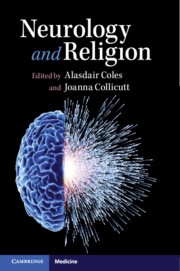Book contents
- Neurology and Religion
- Neurology and Religion
- Copyright page
- Contents
- Contributors
- Preface
- Part I The Neurological Study of Religion
- I.I The Natures of Neurology and Religion
- I.II Philosophical and Historical Issues
- Chapter 4 Embodied Cognition and the Neurology of Religion
- Chapter 5 Phenomenology, Neurology, Psychiatry and Religious Commitment
- Chapter 6 Philosophical Hazards in the Neuroscientific Study of Religion
- Chapter 7 The Glass Onion
- Chapter 8 Towards an Islamic Neuropsychiatry
- Part II Neurology and Religion
- Bibliography
- Index
Chapter 5 - Phenomenology, Neurology, Psychiatry and Religious Commitment
from I.II - Philosophical and Historical Issues
Published online by Cambridge University Press: 28 October 2019
- Neurology and Religion
- Neurology and Religion
- Copyright page
- Contents
- Contributors
- Preface
- Part I The Neurological Study of Religion
- I.I The Natures of Neurology and Religion
- I.II Philosophical and Historical Issues
- Chapter 4 Embodied Cognition and the Neurology of Religion
- Chapter 5 Phenomenology, Neurology, Psychiatry and Religious Commitment
- Chapter 6 Philosophical Hazards in the Neuroscientific Study of Religion
- Chapter 7 The Glass Onion
- Chapter 8 Towards an Islamic Neuropsychiatry
- Part II Neurology and Religion
- Bibliography
- Index
Summary
This chapter offers a phenomenological analysis of changes in the structure of experience that fundamentally characterise both several main forms of neuropsychiatric illness and the nature of religious commitment. The use of the portmanteau term ‘neuropsychiatric’ acknowledges the fact that many of the conditions discussed in this chapter do not fit neatly within the shifting and unclear professional boundaries of psychiatry and neurology, a problem with which other chapters in this volume engage. In this chapter, in fact, I propose that these conditions are best understood phenomenologically in a way that challenges those professional partitions. Specifically, neuropsychiatric illness and religious commitment both involve distinctive changes to the structure of first-person experience that can be characterised phenomenologically in terms of altered existential feelings – a neglected set of affective states, currently a topic of research by philosophers, psychiatrists and cognitive scientists. Later in the chapter, I go on to make the further, stronger claim that the fundamentally phenomenological character of neuropsychiatric and religious experience assigns investigative and interpretive priority to phenomenology rather than to neuroscience. As a caveat before beginning, my claim is not that neuropsychiatric illness and religious commitment are identical or that religiosity is pathological, though doubtless they can be, and indeed surely are, complexly related in many cases.1 Instead, the claim is that what a person experiences during neuropsychiatric illness and in religious commitment ought to be understood phenomenologically in terms of alterations in their existential feeling.
- Type
- Chapter
- Information
- Neurology and Religion , pp. 35 - 47Publisher: Cambridge University PressPrint publication year: 2019



